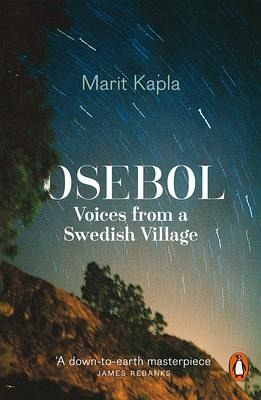
Osebol
Voices from a Swedish Village
Übersetzung: Graves, Peter

PAYBACK Punkte
7 °P sammeln!
A SUNDAY TELEGRAPH AND GUARDIAN BOOK OF THE YEARWINNER OF SWEDEN'S AUGUST PRIZEWINNER OF THE WARWICK PRIZE FOR WOMEN IN TRANSLATIONSHORTLISTED FOR THE BRITISH ACADEMY BOOK PRIZE'Osebol is a magnificent success; it is hard to imagine it better ... Kapla is a magician ... mesmerizing' Sara Wheeler, TLS'A simple, pared-back and down-to-earth masterpiece' James Rebanks'We listen to them like something caught on the wind ... so moving and so strangely beckoning' Nicci Gerrard, Observer'[Among] the year's most pleasing books' Rishi Dastidar, Guardian, Books of the Year'Engrossing and humbling and qu...
A SUNDAY TELEGRAPH AND GUARDIAN BOOK OF THE YEAR
WINNER OF SWEDEN'S AUGUST PRIZE
WINNER OF THE WARWICK PRIZE FOR WOMEN IN TRANSLATION
SHORTLISTED FOR THE BRITISH ACADEMY BOOK PRIZE
'Osebol is a magnificent success; it is hard to imagine it better ... Kapla is a magician ... mesmerizing' Sara Wheeler, TLS
'A simple, pared-back and down-to-earth masterpiece' James Rebanks
'We listen to them like something caught on the wind ... so moving and so strangely beckoning' Nicci Gerrard, Observer
'[Among] the year's most pleasing books' Rishi Dastidar, Guardian, Books of the Year
'Engrossing and humbling and quietly revelatory' Max Porter
'Fascinating ... I was riveted' Lydia Davis
'Like standing outside an open window on a warm summer evening and listening to a piece of contemporary history' Länstidningen
'What a wonderful book . . . You want to move into it' Expressen
Near the river Klarälven, snug in the dense forest landscape of northern Värmland, lies the secluded village of Osebol. It is a quiet place: one where relationships take root over decades, and where the bustle of city life is replaced by the sound of wind in the trees.
In this extraordinary and engrossing book, an unexpected cultural phenomenon in its native Sweden, the stories of Osebol's residents are brought to life in their own words. Over the last half-century, the automation of the lumber industry and the steady relocations to the cities have seen the village's adult population fall to roughly forty. But still, life goes on; heirlooms are passed from hand to hand, and memories from mouth to mouth, while new arrivals come from near and far.
Marit Kapla has interviewed nearly every villager between the ages of 18 and 92, recording their stories verbatim. What emerges is at once a familiar chronicle of great social metamorphosis, told from the inside, and a beautifully microcosmic portrait of a place and its people. To read Osebol is to lose oneself in its gentle rhythms of simple language and open space, and to emerge feeling like one has really grown to know the inhabitants of this varied community, nestled among the trees in a changing world.
WINNER OF SWEDEN'S AUGUST PRIZE
WINNER OF THE WARWICK PRIZE FOR WOMEN IN TRANSLATION
SHORTLISTED FOR THE BRITISH ACADEMY BOOK PRIZE
'Osebol is a magnificent success; it is hard to imagine it better ... Kapla is a magician ... mesmerizing' Sara Wheeler, TLS
'A simple, pared-back and down-to-earth masterpiece' James Rebanks
'We listen to them like something caught on the wind ... so moving and so strangely beckoning' Nicci Gerrard, Observer
'[Among] the year's most pleasing books' Rishi Dastidar, Guardian, Books of the Year
'Engrossing and humbling and quietly revelatory' Max Porter
'Fascinating ... I was riveted' Lydia Davis
'Like standing outside an open window on a warm summer evening and listening to a piece of contemporary history' Länstidningen
'What a wonderful book . . . You want to move into it' Expressen
Near the river Klarälven, snug in the dense forest landscape of northern Värmland, lies the secluded village of Osebol. It is a quiet place: one where relationships take root over decades, and where the bustle of city life is replaced by the sound of wind in the trees.
In this extraordinary and engrossing book, an unexpected cultural phenomenon in its native Sweden, the stories of Osebol's residents are brought to life in their own words. Over the last half-century, the automation of the lumber industry and the steady relocations to the cities have seen the village's adult population fall to roughly forty. But still, life goes on; heirlooms are passed from hand to hand, and memories from mouth to mouth, while new arrivals come from near and far.
Marit Kapla has interviewed nearly every villager between the ages of 18 and 92, recording their stories verbatim. What emerges is at once a familiar chronicle of great social metamorphosis, told from the inside, and a beautifully microcosmic portrait of a place and its people. To read Osebol is to lose oneself in its gentle rhythms of simple language and open space, and to emerge feeling like one has really grown to know the inhabitants of this varied community, nestled among the trees in a changing world.













